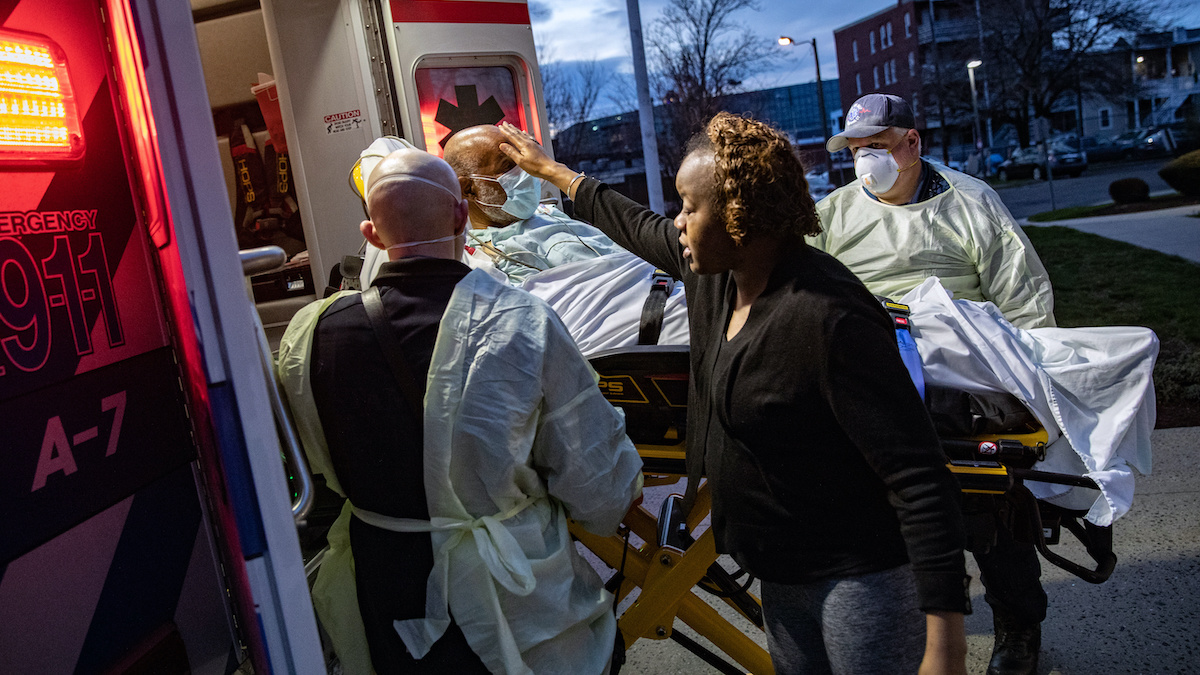
Black and Hispanic Americans Suffer Disproportionate Coronavirus Infections

A daughter touches her father's head while saying goodbye as medics prepare to transport him to Stamford Hospital on April 02, 2020 in Stamford, Connecticut. He had multiple COVID-19 symptoms. John Moore / Getty Images
Across the country, the novel coronavirus is severely affecting black people at much higher rates than whites, according to data released by several states, as The New York Times reported.
In New York, which has seen the most COVID-19 related deaths, the virus has disproportionately affected both the black and Hispanic population. In New York City, Hispanics make up 29 percent of the population, but 34 percent of the city’s COVID-19 deaths, while African-Americans are 22 percent of the city’s population and 28 percent of the fatalities, according to new statistics from the city, as US News and World Report.
When I saw this, it made me very angry,” Mayor Bill de Blasio said Wednesday, as Politico reported. “It’s sick. It’s troubling. It’s wrong.”
Public health researchers say the alarming statistics highlight inequalities in resources, health, and access to care. Pervasive health conditions like asthma, diabetes and heart disease put people at a higher risk of getting seriously ill or dying if they contract COVID-19.
“There are clear inequalities, clear disparities in how this disease is affecting the people of our city,” de Blasio said, as Politico reported. “So many people struggle to get the healthcare they need, who didn’t have the money to afford the healthcare they deserved. So many people have lived with chronic healthcare conditions.”
As Business Insider reported, the numbers across the country have been even more disproportionate. In Chicago, where African-Americans make up 32 percent of the population, they have accounted for 72 percent of virus-related deaths and more than half of all positive test results. Similarly, in Milwaukee, blacks make up 28 percent of the population but have been 73 percent of all COVID-19 related deaths.
“Those numbers take your breath away, they really do,” said Lori Lightfoot, the mayor of Chicago, as The New York Times reported. She is the city’s first black woman elected as mayor. She added that the statistics were “among the most shocking things I think I’ve seen as mayor.”
The statistics moved Dr. Anthnony Fauci, who sits on the president’s coronavirus task force, to address societal health disparities at the White House on Tuesday.
“And the reason I want to bring it up, because I couldn’t help sitting there reflecting on how sometimes when you’re in the middle of a crisis, like we are now with the coronavirus, it really does … ultimately, shine a very bright light on some of the real weaknesses and foibles in our society,” Fauci said, as Business Insider reported.
“As some of you may know, the greater proportion of my professional career has been defined by HIV/AIDS, and if you go back then during that period of time when there was extraordinary stigma — particularly against the gay community — and it was only when the world realized how the gay community responded to this outbreak with incredible courage and dignity and strength and activism, that I think that really changed some of the stigma against the gay community, very much so.
“I see a similarity here because health disparities have always existed for the African American community. But here again, with the crisis, how it’s shining a bright light on how unacceptable that is,” he said.
Sharrelle Barber, an assistant research professor of epidemiology and biostatistics at Drexel University, told The New York Times that the effects of policies drawn up generations ago keep many black residents in segregated neighborhoods without job opportunities, stable housing, or grocery stores with healthy food and more.
“These communities, structurally, they’re breeding grounds for the transmission of the disease,” Barber said. “It’s not biological. It’s really these existing structural inequalities that are going to shape the racial inequalities in this pandemic.”
- New Drilling and Fracking in California Will Hurt Latino Communities ...
- First-of-Its-Kind Study Finds Racial Gap Between Who Causes Air ...
- Environmental Negligence vs. Civil Rights: Black and Hispanic ...
- U.S. Coronavirus Deaths Pass 100,000 - EcoWatch
- This Is How COVID-19 Is Affecting Indigenous People
- U.S. COVID-19 Death Toll Passes 130,000 Amid Surge in Cases - EcoWatch
- U.S. Coronavirus Death Toll Tops 150,000 as Country Struggles to Contain Virus - EcoWatch
- U.S. Coronavirus Death Toll Tops 170,000 Ahead of Flu Season - EcoWatch

 233k
233k  41k
41k  Subscribe
Subscribe 